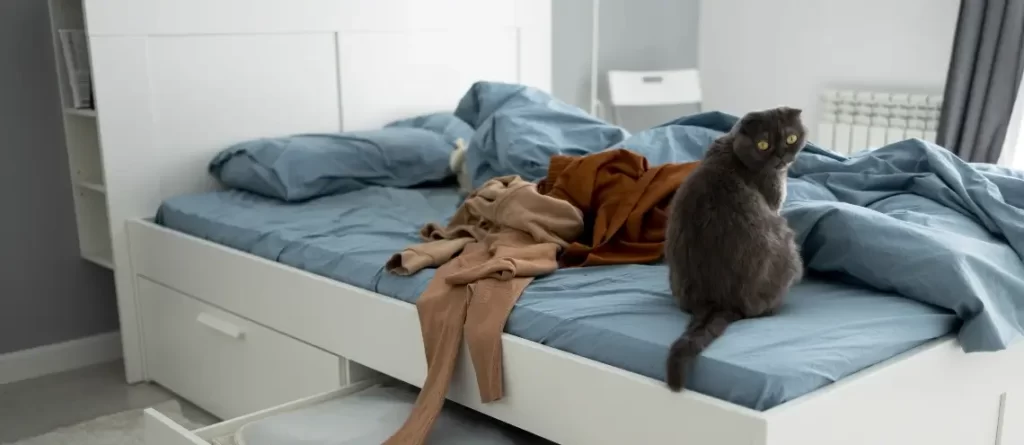Bed Bugs: Three Things Travelers Need to Know

Once existing as almost a myth, bed bugs have made their comeback as a global resurgence that has infiltrated France, South Korea, and across the United Kingdom. As 2023 draws to a close, experts worry that travelers may unknowingly bring these blood-sucking pests into Singapore.
During an announcement on national television, the deputy mayor of Paris Emmanuel Gregoire urged the residents to take the “widespread” phenomenon seriously. He emphasized how easily bed bugs can spread from household to household.
“You have to understand that in reality no one is safe, obviously there are risk factors, but in reality, you can catch bedbugs anywhere and bring them home,” he said.
On the other side of the globe, South Korea has launched a four-week campaign to raise awareness about pest control measures and enforce inspections of public facilities after receiving around 30 reports of bed bug infestations nationwide late October and early November.
But what are bed bugs? How can they spread all across the world? And will Singapore be spared from their infestations? Pacific Prime CXA has all the answers you need to know about these problematic pests in this comprehensive article!

What are Bed Bugs?
Small and mighty, bed bugs are wingless nocturnal pests with flat and oval bodies that feast on human blood. While there’s currently no report on infections or diseases transmitted from these bugs to humans, their bites can cause itchiness, red bumps, and allergic reactions in some individuals.
What do Bed Bugs Look Like?
While bed bugs may look similar to other small insects, these little fellows have features that distinguish them from others. Adult bed bugs, young bed bugs, and their eggs can be identified with sizes, shapes, and smell. Accurately identifying them is key to choosing appropriate preventive methods.

The main characteristics of most adult bed bugs are:
A body the size of an apple seed (around 5-7 millimeters)
A long brown body that’s flat and oval when not fed recently
A balloon-like reddish-brown body that’s more elongated if fed recently
A beak with three segments
An antenna with four parts
Wings that aren’t used for flying
Short golden-colored hairs
A lower side of the body with a musty-sweetish odor

Also known as nymphs, young bed bugs typically have these characteristics:
A body smaller than an apple seed
A translucent or whitish-yellow body that can be nearly invisible to the eye if not fed recently
Lastly, to identify bed bug eggs, the characteristics you need to look for are:
An egg the size of a pinhead
A pearl-white egg marked by an eyespot if more than five days old
What Can Bed Bugs Do to My Body?
While bed bugs are mostly considered harmless, their bites can result in a variety of responses, ranging from no visible signs to a small red mark, or even a severe allergic reaction. If you have an allergic reaction to several bed bug bites, it’s important to seek medical help right away.

Signs on your body and living space indicating that you have bed bugs include:
Reddish stains on your bedsheets, pillows, mattress, or nearby furniture since bed bugs normally produce blood-filled fecal materials
Dark spots about the size of a poppy seed from bed bug excrement on your bedsheets, pillows, mattress, or nearby furniture
Small yellow skins that are the exoskeletons bed bugs will shed as they grow
A sweet and musty odor around your bed or nearby furniture and clothes
Bed bug eggs or eggshells
The bed bugs themselves
Another key indicator of a bed bug infestation is the presence of their bites. These troublesome bugs leave small itchy red bite marks that may show up on most individuals within 14 days after being bitten. In some cases, the bites can be highly swollen or may not have any visible marks at all.
You should see a doctor if you have many bed bug bites or any of the following reactions:
Blisters
Skin infection such as the one that makes the bitten areas feel tender and ooze discharge
Allergic reactions such as red skin, swollen marks, and itchy welts

How do Bed Bugs Spread?
Bed bugs’ small and flat bodies make it easier for them to crawl and hide in small cracks and tight spaces. These wingless bugs will sneak their ways onto a traveler’s clothes or luggage before infesting other locations. They also have the ability to move within walls and infrastructure.
Unlike lice, bed bugs don’t travel directly onto human skin and spread from one person to another. They cling on people’s clothes and travel with them instead. If there’s no one to carry them, they’ll slowly move within walls, through floor and ceiling openings, and on pipes from house to house.
Where Do Bed Bugs Hide?
Despite the name, bed bugs can be found in places other than beds, such as wall cracks, seams of chairs, cushions, curtains, electrical appliances, and even a screw. These tiny bugs normally hide during the day and come out at night, traveling 5-20 feet from their hiding places to feed on a host.

Surviving at temperatures as low as seven degree celsius or 46 degree fahrenheit and dying when their body temperature reaches 45 degree celsius or 113 degree fahrenheit, there’s a variety of places bed bugs can squeeze their flattened bodies in to hide during the day, including but not limited to:
Mattresses, box springs, bed frames, and headboards
Cracks and crevices in walls and floors
Chairs and couches
Cushions
Curtains
Drawer joints
Picture frames
Electrical outlets and appliances
Wallpaper and wall hangings
The junction where the wall and the ceiling meet
The head of a screw
Regular inspection and thorough cleaning of these hiding spots will greatly help in preventing infestations and lowering the impact tiny bed bugs may have on you and your living space.

How Can I Prevent Bed Bug Infestations?
Apart from regular house inspections and cleaning, integrated pest management (IPM) is the approach most recommended for bed bug control and prevention as it poses the lowest risk to humans and the environment. While some opt for pesticides, they can be ineffective and harmful if not used properly.
According to the New York State (NYS)’s Department of Health, the IPM approach encompasses the following strategies:
Keep your bedroom tidy and free of clutter.
Position your bed away from walls or other furniture.
Vacuum floors, windows, and moldings daily while paying special attention to the sides and seams of mattresses, box springs, and other furniture. Dispose of the vacuum contents in a sealed container outside of your house.
Wash your bedsheets, pillowcases, blankets, and bed skirts before drying them in a hot dryer for at least 30 minutes. Consider using dust mite covers for mattresses and box springs and seal them with duct tape.
Seal any cracks, crevices, or openings where pipes or wires enter your home.

If you’re considering using an alternative like pesticides, make sure that you use pesticides registered under Singapore’s National Environment Agency that are labeled to control bed bugs. You may look for the registration mark and numbers to ensure the validity of the pesticide you’re buying.
The NYS also suggests that you follow these rules when using pesticides:
Refrain from applying pesticides directly to your skin as there aren’t any approved repellents for controlling bed bugs that can be used on human skin.
Don’t use outdoor pesticides inside your home.
When seeking professional pest control assistance, look for a licensed company that has a proven track record in dealing with bed bugs using the IPM practices.
Getting rid of bed bugs requires not only time and consistency but also the cooperation from all parties involved, such as your landlords and neighbors. Pest control services can also be costly, but since bed bugs are mainly an annoyance rather than a health concern, prevention is the best approach.

Will Singapore See the Rise in Bed Bug Infestations?
Considered one of Southeast Asia’s biggest tourist hubs, Singapore can expect waves of travelers as the end of year approaches. While pest control companies receive more enquiries about bed bugs, which usually get into the country with travelers, vigilance against infestations becomes pivotal.
The Singapore Pest Management Association has mentioned that the Lion City is a global transit, so “the risk of Singapore travelers returning with bedbugs is a reality that we have to be prepared for, with the possibility of bedbugs being spread to home premises or public transportation.”
Aardwolf Pestkare, a well-known pest control firm in Singapore, has reported around a 40% increase of bed bug cases since September 2023 as Paris and South Korea grapple with infestations. The firm’s sales manager Pierce Chan stated that this global resurgence requires cooperation from everyone.
“Personal hygiene is a very important factor. We just have to keep a lookout to places that we travel, especially in hotel rooms and the things that we are going to bring back from overseas,” he said, stressing that not only Singaporean travelers but every traveler should take this matter seriously.
Another pest control firm Killem Pest has also noticed an increase in bedbug enquiries since the beginning of November. The firm suggests that their clients conduct routine inspections in areas such as hotels, public transport vehicles and train stations, schools, as well as healthcare centers.

Stay Protected with Pacific Prime
Bed bugs may not cause major health issues, but allergic reactions to their bites can lead to more severe complications. With infestations rapidly spreading across the globe, Singapore is also at risk. Residents of the Lion City are highly advised to stay vigilant and keep their houses clean.
Still, these tiny pests may sneak their way into your home no matter how careful you are. If you experience a symptom that requires professional medical care, securing comprehensive health insurance can provide access to Singapore’s top medical facilities without incurring out-of-pocket expenses.
Coverage for bed bugs is normally an additional benefit required to purchase with health insurance, but you can plan for the most cost-effective option when it comes to selecting the right insurance policy with thorough planning and advice from an experienced insurance broker like Pacific Prime.

If you’d like to further protect your home from infestations, you may consider securing home insurance. Like health insurance, bed bugs aren’t generally covered in most home insurance policies as they’re deemed preventable. There are only some instances providers will offer coverage for bed bugs.
Utilizing over 20 years of experience in the industry, our team of experts is more than ready to help you strategize for the most optimal coverage according to your needs and budget, regardless of whether you’re looking for home, individual, family, short-term, or travel insurance in Singapore.
Contact Pacific Prime for unbiased advice and an obligation-free plan comparison service today!

 Natthachamon Suthana Komalrachun is a Content Writer with a strong passion in creative writing and marketing communications. Working with the team of experienced creators at Pacific Prime, she aims to use the magic of communication to simplify insurance and enchant every reader in our diverse society where insurance and employee benefits act as a life and financial stronghold for everyone—individuals and businesses alike.
Natthachamon Suthana Komalrachun is a Content Writer with a strong passion in creative writing and marketing communications. Working with the team of experienced creators at Pacific Prime, she aims to use the magic of communication to simplify insurance and enchant every reader in our diverse society where insurance and employee benefits act as a life and financial stronghold for everyone—individuals and businesses alike.
After graduating at the top of her class and earning her Bachelor’s Degree in English from Thammasat University, Natthachamon has been practicing her writing skills and making education more easily accessible for Thai children as an Educational Content Creator and English Curriculum Developer for various educational facilities and organizations across the country.
Natthachamon is also a mother of two cats, a board game enthusiast, and a big bookworm who enjoys everything and anything sweet.







